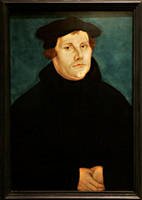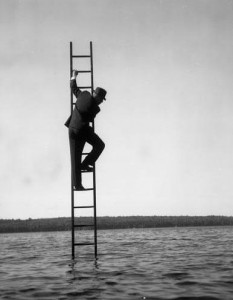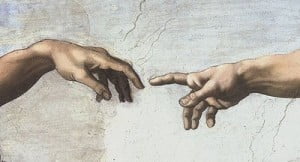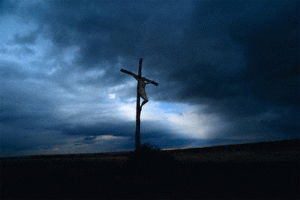Martin Luther’s unshakable faith in God’s Word was the foundation of his faith and actions. In this excellent biography put together by John Piper, we’re reminded of the importance and prominence The Bible should have in the life of every one who hungers for God. – Paul.
Martin Luther Discovers the Book
One of the great rediscoveries of the Reformation -especially of Martin Luther- was that the Word of God comes to us in a form of a Book. In other words Luther grasped this powerful fact: God preserves the experience of salvation and holiness from generation to generation by means of a Book of revelation, not a bishop in Rome, and not the ecstasies of Thomas Muenzer and the Zwickau prophets (see note 1). The Word of God comes to us in a Book. That rediscovery shaped Luther and the Reformation.
One of Luther’s arch-opponents in the Roman Church, Sylvester Prierias, wrote in response to Luther’s 95 theses: “He who does not accept the doctrine of the Church of Rome and pontiff of Rome as an infallible rule of faith, from which the Holy Scriptures, too, draw their strength and authority, is a heretic” (see note 2). In other words, the Church and the pope are the authoritative deposit of salvation and the Word of God; and the Book is derivative and secondary. “What is new in Luther,” Heiko Oberman says, “is the notion of absolute obedience to the Scriptures against any authorities; be they popes or councils” (see note 3). In other words the saving, sanctifying, authoritative Word of God comes to us in a Book. The implications of this simple observation are tremendous.
In 1539, commenting on Psalm 119, Luther wrote, “In this psalm David always says that he will speak, think, talk, hear, read, day and night constantly—but about nothing else than God’s Word and Commandments. For God wants to give you His Spirit only through the external Word” (see note 4). This phrase is extremely important. The “external Word” is the Book. And the saving, sanctifying, illuminating Spirit of God, he says, comes to us through this “external Word.”
Luther calls it the “external Word” to emphasize that it is objective, fixed, outside ourselves, and therefore unchanging. It is a Book. Neither ecclesiastical hierarchy nor fanatical ecstasy can replace it or shape it. It is “external,” like God. You can take or leave it. But you can’t make it other than what it is. It is a book with fixed letters and words and sentences.
And Luther said with resounding forcefulness in 1545, the year before he died, “Let the man who would hear God speak, read Holy Scripture” (see note 5). Earlier he had said in his lectures on Genesis, “The Holy Spirit himself and God, the Creator of all things, is the Author of this book” (see note 6). One of the implications of the fact that the Word of God comes to us in a book is that the theme of this conference is “The Pastor and His Study,” not “The Pastor and His Seance,” or “The Pastor and His Intuition,” or “The Pastor and His Religious Multi-perspectivalism.” The Word of God that saves and sanctifies, from generation to generation, is preserved in a Book. And therefore at the heart of every pastor’s work is book-work. Call it reading, meditation, reflection, cogitation, study, exegesis, or whatever you will—a large and central part of our work is to wrestle God’s meaning from a Book, and proclaim it in the power of the Holy Spirit.
Luther knew, that some would stumble over the sheer conservatism of this simple, unchangeable fact. God’s Word is fixed in a book. He knew then, as we know today, that many say this assertion nullifies or minimizes the crucial role of the Holy Spirit in giving life and light. Luther would, I think, say, “Yes, that might happen.” One might argue that emphasizing the brightness of the sun nullifies the surgeon who takes away blindness. But most people would not agree with that. Certainly not Luther.
He said in 1520, “Be assured that no one will make a doctor of the Holy Scripture save only the Holy Ghost from heaven” (see note 7). Luther was a great lover of the Holy Spirit. And his exaltation of the Book as the “external Word” did not belittle the Spirit. On the contrary it elevated the Spirit’s great gift to Christendom. In 1533 he said, “The Word of God is the greatest, most necessary, and most important thing in Christendom” (see note 8). Without the “external Word” we would not know one spirit from the other, and the objective personality of the Holy Spirit himself would be lost in a blur of subjective expressions. Cherishing the Book implied to Luther that the Holy Spirit is a beautiful person to be known and loved, not a buzz to be felt.
Another objection to Luther’s emphasis on the Book is that it minimizes the incarnate Word, Jesus Christ himself. Luther says the opposite is true. To the degree that the Word of God is disconnected from the objective, “external Word,” to that degree the incarnate Word, the historical Jesus, becomes a wax nose for the preferences of every generation. Luther had one weapon with which to rescue the incarnate Word form being sold in the markets of Wittenberg. He drove out the money changers—the indulgence sellers—with the whip of the “external Word,” the Book.
When he posted the 95 theses on October 31, 1517, number 45 read, “Christians should be taught that he who sees someone needy but looks past him, and buys an indulgence instead, receives not the pope’s remission but God’s wrath” (see note 9). That blow fell from the Book—from the story of the Good Samaritan and from the second great commandment in the Book, “external Word.” And without the Book there would be no blow. And the incarnate Word would be everybody’s clay toy. So precisely for the sake of the incarnate Word Luther exalts the written Word, the “external Word.”
It is true that the church needs to see the Lord in his earthly talking and walking on the earth. Our faith is rooted in that decisive revelation in history. But Luther reasserted that this seeing happens through a written record. The incarnate Word is revealed to us in a Book (see note 10). Is it not remarkable the Spirit in Luther’s day, and in our day, is virtually silent about the incarnate Lord—except in amplifying the glory of the Lord through the written record of the incarnate Word.
Neither the Roman church nor charismatic prophets claimed that the Spirit of the Lord narrated to them untold events of the historical Jesus. This is astonishing. Of all the claims to authority over the “external Word,” (by the pope), and along-side the “external Word” (by the prophets), none of them brings forth new information about the incarnate life and ministry of Jesus. Rome will dare to add facts to the life of Mary [for example, the immaculate conception (see note 11)], but not to the life of Jesus. Charismatic prophets will announce new movements of the Lord in the sixteenth century, and in our day, but none seems to report a new parable or a new miracle of the incarnate Word omitted from the Gospels. Neither Roman authority nor prophetic ecstasy adds to or deletes from the external record of the incarnate Word (see note 12).
Why is the Spirit so silent about the incarnate Word—even among those who encroach on the authority of the Book? The answer seems to be that it pleased God to reveal the incarnate Word to all succeeding generations through a Book, especially the Gospels. Luther put it like this:
The apostles themselves considered it necessary to put the New Testament into Greek and to bind it fast to that language, doubtless in order to preserve it for us safe and sound as in a sacred ark. For they foresaw all that was to come and now has come to pass, and knew that if it were contained only in one’s heads, wild and fearful disorder and confusion, and many various interpretations, fancies and doctrines would arise in the Church, which could be prevented and from which the plain man could be protected only by committing the New Testament to writing the language (see note 13).
The ministry of the internal Spirit does not nullify the ministry of the “external Word.” He does not duplicate what is was designed to do. The Spirit glorifies the incarnate Word of the Gospels, but he does not re-narrate his words and deeds for the illiterate people or negligent pastors.
The immense implication of this for the pastoral ministry is that we pastors are essentially brokers of the Word of God transmitted in a Book. We are fundamentally readers, and teachers and proclaimers of the message of the Book. And all of this is for the glory of the incarnate Word and by the power of the indwelling Spirit. But neither the indwelling Spirit nor the incarnate Word leads us away from the Book that Luther called “the external Word.” Christ stands forth for our worship and our fellowship and our obedience from the “external Word.” This is where we see the glory of God in the face of Christ” (2 Corinthians 4:6). So it’s for the sake of Christ that the Spirit broods over the Book where Christ is clear, not over trances where he is obscure.
The specific question that I want to try to answer with you is what difference this discovery of the Book made in the way Luther carried out his ministry of the Word. What can we learn from Luther at study? His entire professional life was lived as a professor in the University of Wittenberg. So it will be helpful to trace his life up to that point and then ask why a professor can be a helpful model for pastors.
The Pathway to the Professorship
Luther was born November 10, 1483 in Eisleben to a copper miner. His father had wanted him to enter the legal profession. And he was on the way to that vocation at the University. According to Heiko Oberman, “There is hardly any authenticated information about those first eighteen years which led Luther to the threshold of the University of Erfurt” (see note 14).
In 1502 at the age of 19 he received his Bachelors degree, ranking, unimpressively, 30th of 57 in his class. In January, 1505 he received his Master of Arts at Erfurt and ranked second among 17 candidates. That summer the providential Damascus-like experience happened. On July 2, on the way home from law school, he was caught in a thunderstorm and hurled to the ground by lightening. He cried out, “Help me, St. Anne; I will become a monk” (see note 15). He feared for his soul and did not know how to find safety in the gospel. So he took the next best thing, the monastery.
Fifteen days later, to his father’s dismay, he kept his vow. On July 17, 1505 he knocked at the gate of the Augustinian Hermits in Erfurt and asked the prior to accept him into the order. Later he said this choice was a flagrant sin—”not worth a farthing” because it was made against his father and out of fear. Then he added, “But how much good the merciful Lord has allowed to come of it!” (see note 16). We see this kind of merciful providence over and over again in the history of the church, and it should protect us form the paralyzing effects of bad decisions in our past. God is not hindered in his sovereign designs from leading us, as he did Luther, out of blunders into fruitful lives of joy.
He was 21 years old when he became an Augustinian Monk. It would be 20 more years until he married Katharina von Bora on June 13, 1525. So there were 20 more years of wrestling with the temptations of a single man who had very powerful drives. But “in the monastery,” he said, “I did not think about women, money, or possessions; instead my heart trembled and fidgeted about whether God would bestow His grace on me … For I had strayed from faith and could not but imagine that I had angered God, whom I in turn had to appease by doing good works” (see note 17). There was no theological gamesmanship in Luther’s early studies. He said, “If I could believe that God was not angry with me, I would stand on my head for joy” (see note 18).
On Easter, April 3 (probably), 1507 he was ordained to the priesthood, and on May 2 he celebrated his first mass. He was so overwhelmed at the thought of God’s majesty, he says, that he almost ran away. The prior persuaded him to continue. Oberman says that this incident is not isolated.
A sense of the “mysterium tremendum,” of the holiness of God, was to be characteristic of Luther throughout his life. It prevented pious routine from creeping into his relations with God and kept his Bible studies, prayers, or reading of the mass from declining into a mechanical matter of course: his ultimate concern in all these is the encounter with the living God (see note 19).
For two years Luther taught aspects of philosophy to the younger monks. He said later that teaching philosophy was like waiting for the real thing (see note 20). In 1509 the real thing came and his beloved superior and counselor and friend, Johannes von Staupitz, admitted Luther to the Bible,” that is, he allowed Luther to teach Bible instead of moral philosophy— Paul instead of Aristotle. Three years later on October 19, 1512, at the age of 28 Luther received his Doctor’s degree in theology, and Staupitz turned over to him the chair in Biblical Theology at the University of Wittenberg which Luther held the rest of his life.
So Luther was a university theology professor all his professional life. This causes us to raise the question whether he can really serve as any kind of model for pastors, or even understand what we pastors face in our kind of ministry. But that would be a mistake. At least three things unite him to our calling.
Why Should Pastors Listen to Luther?
1. He was more a preacher than any of us pastors.
He knew the burden and the pressure of weekly preaching. There were two churches in Wittenberg, the town church and the castle church. Luther was a regular preacher at the town church. He said, “If I could today become king or emperor, I would not give up my office as preacher” (see note 21). He was driven by a passion for the exaltation of God in the Word. In one of his prayers he says, “Dear Lord God, I want to preach so that you are glorified. I want to speak of you, praise you, praise your name. Although I probably cannot make it turn out well, won’t you make it turn out well?” (see note 22).
To feel the force of this commitment you have to realize that in the church in Wittenberg in those days there were no programs, but only worship and preaching; Sunday 5:00 a.m. worship with a sermon on the Epistle, 10:00 a.m. with a sermon on the Gospel, an afternoon message on the Old Testament or catechism. Monday and Tuesday sermons were on the Catechism; Wednesdays on Matthew; Thursdays and Fridays on the Apostolic letters; and Saturday on John (see note 23).
Luther was not the pastor of the town church. His friend, Johannes Bugenhagen was from 1521 to 1558. But Luther shared the preaching virtually every week he was in town. He preached because the people of the town wanted to hear him and because he and his contemporaries understood his doctorate in theology to be a call to teach the word of God to the whole church. So Luther would often preach twice on Sunday and once during the week. Walther von Loewenich said in his biography, “Luther was one of the greatest preachers in the history of Christendom … Between 1510 and 1546 Luther preached approximately 3,000 sermons. Frequently he preached several times a week, often two or more times a day” (see note 24).
For example, in 1522 he preached 117 sermons in Wittenberg and 137 sermons the next year. In 1528 he preached almost 200 times, and from 1529 we have 121 sermons. So the average in those four years was one sermon every two-and-a-half days. As Fred Meuser says in his book on Luther’s preaching, “Never a weekend off—he knows all about that. Never even a weekday off. Never any respite at all from preaching, teaching, private study, production, writing, counseling” (see note 25). That’s his first link with us pastors. He knows the burden of preaching.
2. Like most pastors, Luther was a family man – at least from age 41 until his death at 62.
He knew the pressure and the heartache of having and rearing and losing children. Katie bore him six children in quick succession: Johannes (1526), Elisabeth (1527), Magdalena (1529), Martin (1531), Paul (1533), and Margaret (1534). Do a little computing here. The year between Elizabeth and Magdalena was the year he preached 200 times (more than once every other day). Add to this that Elizabeth died that year at eight months old, and he kept on going under that pain.
And lest we think Luther neglected the children, consider that on Sunday afternoons, often after preaching twice, Luther led the household devotions, which were virtually another worship service for an hour including the guests as well as the children (see note 26). So Luther knew the pressures of being a public and pressured family man.
3. Luther was a churchman, not an ivory tower theological scholar.
He was not only part of almost all the controversies and conferences of his day, he was usually the leader. There was the Heidelberg Disputation (1518), the encounter with Cardinal Cajetan at Augsburg (1518), the Leipzig Disputation, with John Eck and Andrew Karlstadt (1519), and the Diet of Augsburg (though he was not there in person, (1513).
Besides active personal involvement in church conferences, there was the unbelievable stream of publications that are all related to the guidance of the church. For example, in 1520, he wrote 133 works; in 1522, 130; in 1523, 183 (one every other day!), and just as many in 1524 (see note 27). He was the lightening rod for every criticism against the Reformation. “All flock to him, besieging his door hourly, trooped citizens, doctors, princes. Diplomatic enigmas were to be solved, knotty theological points were to be settled, the ethics of social life were to be laid down” (see note 28).
With the breakdown of the medieval system of church life, a while new way of thinking about church and the Christian life had to be developed. And in Germany the task fell in large measure to Martin Luther. It is astonishing how he threw himself into the mundane matters of parish life. For example, when it was decided that “Visitors” from the state and university would be sent to each parish to assess the condition of the church and make suggestions for church life, Luther took it upon himself to write the guidelines:”Instructions for the Visitors of Parish Pastors in Electoral Saxony.” He addressed a broad array of practical issues. When he came to the the education of children he went so far as to dictate how the lower grades should be divided into three groups: pre-readers, readers and advanced readers. then he made suggestions for how to teach them.
“They shall first learn to read the primer in which are found the alphabet, the Lord’s prayer, the Creed, and other prayers. When they have learned this they shall be given Donatus and Cato, to read Donatus and to expound Cato. The schoolmaster is to expound one or two verses at a time, and the children are to repeat these at a later time, so that they thereby build up a vocabulary” (see note 29).
I mention this simply to show that this university professor was intensely involved in trying to solve the most practical ministry problems from the cradle to the grave. He did not do his studying in the uninterrupted leisure of sabbaticals and long summers. He was constantly besieged and constantly at work.
So I conclude, that though he was a university professor, there is reason we pastors should look at his work and listen to his words, in order to learn and be inspired for the ministry of the Word—the “external Word,” the Book.
Luther at Study: The Difference the Book Made
For Luther the importance of study was so interwoven with his discovery of the true gospel that he could never treat study as any other than utterly crucial and life-giving and history-shaping. For him study had been the gateway to the gospel and to the Reformation and to God. We take so much for granted today about the truth and about the Word that we can hardly imagine what it cost Luther to break through to the truth and sustain access to the Word. For Luther study mattered. His life and the life of the church hung on it. We need to ask whether all the ground gained by Luther and the other reformers may be lost over time if we lose this passion for study, while assuming that truth will remain obvious and available.
To see this intertwining of study and gospel let’s go back to the early years in Wittenberg. Luther dates the great discovery of the gospel in 1518 during his series of lectures on Psalms (see note 30). He tells the story in his Preface to the Complete Edition of Luther’s Latin Writings. This account of the discovery is taken from that Preface written March 5, 1545, the year before his death. Watch for the references to his study of Scripture (italicized).
I had indeed been captivated with an extraordinary ardor for understanding Paul in the Epistle to the Romans. But up till then it was … a single word in Chapter 1 [:17], ‘In it the righteousness of God is revealed,’ that had stood in my way. For I hated that word ‘righteousness of God,’ which according to the use and custom of all the teachers, I had been taught to understand philosophically regarding the formal or active righteousness, as they called it, with which God is righteous and punishes the unrighteous sinner.
Though I lived as a monk without reproach, I felt that I was a sinner before God with an extremely disturbed conscience. I could not believe that he was placated by my satisfaction. I did not love, yes, I hated the righteous God who punishes sinners, and secretly, if not blasphemously, certainly murmuring greatly, I was angry with God, and said, “As if, indeed, it is not enough, that miserable sinners, eternally lost through original sin, are crushed by every kind of calamity by the law of the decalogue, without having God add pain to pain by the gospel and also by the gospel threatening us with his righteous wrath!” Thus I raged with a fierce and trouble conscience. Nevertheless, I beat importunately upon Paul at that place, most ardently desiring to know what St. Paul wanted.
At last, by the mercy of God, meditating day and night, I gave heed to the context of the words, namely, “In it righteousness of God is revealed, as it is written, “He who through faith is righteous shall live.” There I began to understand [that] the righteousness of God is that by which the righteous lives by a gift of God, namely by faith. And this is the meaning: the righteousness of God is revealed by the gospel, namely, the passive righteousness with which [the] merciful God justifies us by faith, as it is written, “He who through faith is righteous shall live.” Here I felt that I was altogether born again and had entered paradise itself through open gates. Here a totally other face of the entire Scripture showed itself to me. Thereupon I ran through the Scriptures from memory …
And I extolled my sweetest word with a love as great as the hatred with which I had before hated the word ‘righteousness of God.’ Thus that place in Paul was for me truth the gate to paradise (see note 31).
Notice how God was brining Luther to the light of the gospel of justification. Six sentences—all of them revealing the intensity of study and wrestling with the Biblical text:
I had indeed been captivated with an extraordinary ardor for understanding Paul in the Epistle to the Romans.
According to the use and custom of all the teachers, I had been taught to understand philosophically. (An approach to study from which he was breaking free.)
I beat importunately upon Paul a that place, most ardently desiring to know what St. Paul wanted.
At last, by the mercy of God, meditating day and night, I gave heed to the context of the words.
Thereupon I ran through the Scriptures from memory.
That place in Paul was for me truly the gate to paradise.
The seeds of all Luther’s study habits are there or clearly implied. What was it, then, that marked the man Luther at study?
1. Luther came to elevate the Biblical text itself far above all commentators or church fathers.
This was not the conclusion of laziness. Melancthon, Luther’s friend and colleague at Wittenberg, said that Luther knew his Dogmatics so well in the early days he could quote whole pages of Gabriel Biel (the standard Dogmatics text, published 1488) by heart (see note 32). It wasn’t lack of energy for the fathers and the philosophers; it was an overriding passion for the superiority of the Biblical text itself.
He wrote in 1533, “For a number of years I have now annually read through the Bible twice. If the Bible were a large, mighty tree and all its words were little branches I have tapped at all the branches, eager to know what was there and what it had to offer” (see note 33). Oberman says Luther kept to that practice for a least ten years (see note 34). The Bible had come to mean more to Luther than all the fathers and commentators.
“He who is well acquainted with the text of Scripture,” Luther said in 1538, “is a distinguished theologian. For a Bible passage or text is of more value than the comments of four authors” (see note 35). In his Open Letter to the Christian Nobility Luther explained his concern:
The writings of all the holy fathers should be read only for a time, in order that though them we may be led to the Holy Scriptures. As it is, however, we read them only to be absorbed in them and never come to the Scriptures. We are like men who study that sign-posts and never travel the road. The dear fathers wished by their writing, to lead us to the Scriptures, but we so use them as to be led away from the Scriptures, though the Scriptures alone are our vineyard in which we ought all to work and toil (see note 36).
The Bible is the pastors vineyard, where he ought to work and toil. But, Luther complained in 1539, “The Bible is being buried by the wealth of commentaries, and the text is being neglected, although in every branch of learning they are the best who are well acquainted with the text” (see note 37). For Luther, this is no mere purist, allegiance to the sources. This is the testimony of a man who found life at the original spring in the mountain, not the secondary stream in the valley. For Luther it was a matter of life and death whether one studied the text of Scripture itself, or spent most of his time reading commentaries and secondary literature. Looking back on the early days of his study of the Scriptures he said,
When I was young, I read the Bible over and over and over again, and was so perfectly acquainted with it, that I could, in an instant, have pointed to any verse that might have been mentioned. I then read the commentators, but soon threw them aside, for I found therein many things my conscience could not approve, as being contrary to the sacred text. ‘Tis always better to see with one’s own eyes than with those of other people (see note 38).
Luther doesn’t mean in all this that there is no place at all for reading other books. After all he wrote books. But he counsels us to make them secondary and make them few. As a slow reader myself, I find this advice very encouraging. He says,
A student who does not want his labor wasted must so read and reread some good writer that the author is changed, as it were, into his flesh and blood. For a great variety of reading confuses and does not teach. It makes the student like a man who dwells everywhere and, therefore, nowhere in particular. Just as we do not daily enjoy the society of every one of our friends but only that of a chosen few, so it should also be in our studying (see note 39).
The number of theological books should … be reduced, and a selection should be made of the best of them; for many books do not make men learned, nor does much reading. But reading something good, and reading it frequently, however little it may be, is the practice that makes men learned in the Scripture and makes them pious besides (see note 40).
2. This radical focus on the text of Scripture itself with secondary literature in secondary place leads Luther to an intense and serious grappling with the very words of Paul and the other Biblical writers.
Instead of running to the commentaries and fathers he says, “I beat importunately upon Paul at that place, most ardently desiring to know what St. Paul wanted.” This was not an isolated incident.
He told his students that the exegete should treat a difficult passage no differently than Moses did the rock in the desert, which he smote with his rod until water gushed out for his thirsty people (see note 41). In other words, strike the text. “I beat importunately upon Paul.” There is a great incentive in this beating on the text: “The Bible is a remarkable fountain: the more one draws and drinks of it, the more it stimulates thirst” (see note 42).
In the summer and fall of 1526 Luther took up the challenge to lecture on Ecclesiastes to the small band of students who stayed behind in Wittenberg during the plague. “Solomon the preacher,” he wrote to a friend, “is giving me a hard time, as though he begrudged anyone lecturing on him. But he must yield” (see note 43).
That is what study was to Luther—taking a text the way Jacob took the angel of the Lord, and saying: “It must yield. I WILL hear and know the Word of God in this text for my soul and for the church!” That’s how he broke through to the meaning of the “righteousness of God” in justification. And that is how he broke through tradition and philosophy again and again.
3. The power and preciousness of what Luther saw when he beat importunately upon Paul’s language convinced him forever that reading Greek and Hebrew was one of the greatest privileges and responsibilities of the Reformation preacher.
Again the motive and conviction here are not academic commitments to high-level scholarship, but spiritual commitments to proclaiming and preserving a pure gospel.
Luther spoke against the backdrop of a thousand years of church darkness without the Word, when he said boldly, “It is certain that unless the languages remain, the Gospel must finally perish” (see note 44). He asks, “Do you inquire what use there is in learning the languages …? do you say, ‘We can read the Bible very well in German?'” And he answers,
Without languages we could not have received the gospel. Languages are the scabbard that contains the sword of the Spirit; they are the casket which contains the priceless jewels of antique thought; they are the vessel that holds the wine; and as the gospel says, they are the baskets in which the loaves and fishes are kept to feed the multitude.
If we neglect the literature we shall eventually lose the gospel … No sooner did men cease to cultivate the languages than Christendom declined, even until it fell under the undisputed dominion of the pope. But no sooner was this torch relighted, than this papal owl fled with a shriek into congenial gloom … In former times the fathers were frequently mistaken, because they were ignorant of the languages and in our days there are some who, like the Waldenses, do not think the languages of any use; but although their doctrine is good, they have often erred i the real meaning of the sacred text; they are without arms against error, and I fear much that their faith will not remain pure (see note 45).
The main issue was the preservation and the purity of the faith. Where the languages are not prized and pursued, care in Biblical observation and Biblical thinking and concern for truth decreases. It has to, because the tools to think otherwise are not present. This was an intensely real possibility for Luther because he had known it. He said, “If the languages had not made me positive as to the true meaning of the word, I might have still remained a chained monk, engaged in quietly preaching Romish errors in the obscurity of a cloister; the pope, the sophists, and their anti-Christian empire would have remained unshaken” (see note 46). In other words, he attributes the breakthrough of the Reformation to the penetrating power of the original languages.
The great linguistic event of Luther’s time was the appearance of the Greek New Testament edited by Desiderius Erasmus. As soon as it appeared in the middle of the summer session of 1516 Luther got it and began to study it and use it in his lectures on Romans 9. He did this even though Erasmus was a theological adversary. Having the languages was such a treasure to Luther he would have gone to school with the devil in order to learn them.
He was convinced that many obstacles in study would be found everywhere without the help of the languages. “St. Augustine”, he said, “is compelled to confess, when he writes in De Doctrina Christiana, that a Christian teacher who is to expound Scripture has need also of the Greek and Hebrew languages in addition to the Latin; otherwise it is impossible for him not to run into obstacles every where” (see note 47).
And he was persuaded that knowing the languages would bring freshness and force to preaching. He said,
Though the faith and the Gospel may be proclaimed by simple preachers without the languages, such preaching is flat and tame, men grow at last wearied and disgusted and it falls to the ground. But when the preacher is versed in the languages, his discourse has freshness and force, the whole of Scripture is treated, and faith finds itself constantly renewed by a continual variety of words and words (see note 48).
Now that is a discouraging overstatement for many pastors who have lost their Greek and Hebrew. What I would say is that knowing the languages can make any devoted preacher a better preacher—more fresh, more faithful, more confident, more penetrating. But it is possible to preach faithfully without them—at least for a season. The test of our faithfulness to the Word, is we have lost our languages, is this: do we have a large enough concern for the church of Christ to promote their preservation and widespread teaching and use in the churches? Or do we, out of self-protection, minimize their importance because to do otherwise stings too badly?
I suspect that for many of us today Luther’s strong words about our neglect and indifference are accurate when he says,
It is a sin and shame not to know our own book or to understand the speech and words of our God; it is a still greater sin and loss that we do not study languages, especially in these days when God is offering and giving us men and books and every facility and inducement to this study, and desires his Bible to be an open book. O how happy the dear fathers would have been if they had our opportunity to study the languages and come thus prepared to the Holy Scriptures! What great toil and effort it cost them to gather up a few crumbs, while we with half the labor— yes, almost without any labor at all—can acquire the whole loaf! O how their effort puts our indolence to shame (see note 49).
4. This reference to “indolence” leads us to the next characteristic of Luther at study, namely, extraordinary diligence in spite of tremendous obstacles.
What he accomplished borders on the superhuman, and of course makes pygmies of us all.
His job as professor of Bible at the University of Wittenberg was full-time work of its own. He wrote theological treatises by the score: biblical, homiletical, liturgical, educational, devotional, and political, some of which have shaped Protestant church life for centuries. All the while he was translating the whole of Scriptures into German, a language that he helped to shape by that very translation. He carried on a voluminous correspondence, for he was constantly asked for advice and counsel. Travel, meetings, conferences, and colloquies were the order of the day. All the while he was preaching regularly to a congregation that he must have regarded as a showcase of the Reformation (see note 50).
We are not Luther and could never be not matter how hard we tried. But the point here is: do we work at our studies with rigor and diligence or are we slothful and casual about it, as if nothing really great is at stake?
When he was just short of sixty years old he pleaded with pastors to be diligent and not lazy.
Some pastors and preachers are lazy and no good. They do not pray; they do not read; they do not search the Scripture … The call is: watch, study attend to reading. In truth you cannot read too much in Scripture; and what you read you cannot read too carefully, and what you read carefully you cannot understand too well, and what you understand well you cannot teach too well, and what you teach well you cannot live too well … The devil … the world … and our flesh are raging and raving against us. Therefore, dear sirs and brothers, pastors and preachers, pray, read, study, be diligent … This evil. shameful time is not the season for being lazy, for sleeping and snoring (see note 51).
Commenting on Genesis 3:19, Luther says, “The household sweat is great; the political sweat is greater; the church sweat is the greatest” (see note 52). He responded once to those who do hard physical labor and consider the work of study a soft life.
Sure, it would be hard for me to sit “in the saddle.” But then again I would like to see the horseman who could sit still for a whole day and gaze at a book without worrying or dreaming or think about anything else. Ask … a preacher … how much work it is to speak and preach … The pen is very light, that is true … But in this work the best part of the human body (the head), the noblest member (the tongue), and the highest work (speech) bear the brunt of the load and work the hardest, while in other kinds of work either the hand, the foot, the back or other members do the work alone so such a person can sing happily or make jokes freely which a sermon writer cannot do. Three fingers do it all … but the whole body and soul have to work at it (see note 53).
There is great danger, Luther says, in thinking we have ever gotten to a point when we fancy we don’t need to study any more. “Let ministers daily pursue their studies with diligence and constantly busy themselves with them … Let them steadily keep on reading, teaching, studying, pondering, and meditating. Nor let them cease until they have discovered and are sure that they have taught the devil to death and have become more learned than God himself and all His saints (see note 54)”—which, of course means never.
Luther knew that there was such a thing as overwork and damaging, counterproductive strain. But he clearly preferred to err on the side of overwork than under-work. We see this in 1532 when he wrote, “A person should work in such a way that he remains well and does no injury to his body. We should not break our heads at work and injure our bodies … I myself used to do such things, and I have racked my brains because I still have not overcome the bad habit of overworking. Nor shall I overcome it as long as I live” (see note 55).
I don’t know if the apostle Paul would have made the same confession at the end of his life. But he did say, “I worked harder than any of [the other apostles]” (1 Corinthians 15:10). And in comparison to the false apostles he said, “Are they servants of Christ? (I speak as if insane) I more so; in far more labors, in far more imprisonments, beaten times without number, often in danger of death” (2 Corinthians 11:23). So it’s not surprising that Luther would strive to follow his dear Paul in “far more labors.”
5. Which leads us to the next characteristic of Luther at study, namely, suffering. For Luther, trials make a theologian. Temptation and affliction are the hermeneutical touchstones.
Luther notices in Psalm 119 that the psalmist not only prayed and meditated over the Word of God in order to understand it; he also suffered in order to understand it. Psalm 119:67, “Before I was afflicted I went astray, but now I keep thy word … 71 It is good for me that I was afflicted, that I may learn Thy statutes.” An indispensable key to understanding the Scriptures is suffering in the path of righteousness.
Thus Luther said: “I want you to know how to study theology in the right way. I have practiced this method myself … Here you will find three rules. They are frequently proposed throughout Psalm [119] and run thus: Oration, meditatio, tentatio (Prayer, meditation, trial) (see note 56). And trials (Anfechtungen) he called the “touchstone.” “[They] teach you not only to know and understand but also to experience how right, how true, how sweet, how lovely, how mighty, how comforting God’s word is: it is wisdom supreme” (see note 57).
He proved the value of trials over and over again in his own experience. “For as soon as God’s Word becomes known through you,” he says, “the devil will afflict you will make a real doctor of you, nd will teach you by his temptations to seek and to love God’s Word. For I myself … owe my papists many thanks for so beating, pressing, and frightening me through the devil’s raging that they have turned me into a fairly good theologian, driving me to a goal I should never have reached” (see note 58).
Suffering was woven into life for Luther. Keep in mind that from 1521 on Luther lived under the ban of the empire. The emperor Charles V said, “I have decided to mobilize everything against Luther: my kingdoms and dominions, my friends, my body, my blood and my soul” (see note 59). He could be legally killed, except where he was protected by his prince.
He endured relentless slander of the most cruel kind. He once observed, “If the Devil can do nothing against the teachings, he attacks the person, lying, slandering, cursing, and ranting at him. Just as the papists’ Beelzebub did to me when he could not subdue my Gospel, he wrote that I was possessed by the Devil, was a changeling, my beloved mother a whore and bath attendant” (see note 60).
Physically he suffered from excruciating kidney stones and headaches with buzzing in his ears and ear infections and incapacitating constipation —”I nearly gave up the ghost—an now, bathed in blood, can find no peace. What took four days to heal immediately tears open again” (see note 61).
It’s not surprising then that emotionally and spiritually he would undergo the most horrible struggles. For example, in a letter to Melancthon on August 2, 1527, he writes, “For more than a week I have been thrown back and forth in death and Hell; my whole body feels beaten, my limbs are still trembling. I almost lost Christ completely, driven about on the waves and storms of despair and blasphemy against God. But because of the intercession of the faithful, God began to take mercy on me and tore my soul from the depths of Hell” (see note 62).
On the outside, to many, he looked invulnerable. But those close to him knew the tentatio. Again eh wrote to Melancthon from the Wartburg castle on July 13, 1521, while he was supposedly working feverishly on the translation of the New Testament:
I sit here at ease, hardened and unfeeling—alas! praying little, grieving little for the Church of God, burning rather in the fierce fires of my untamed flesh. It comes to this: I should be afire in the spirit; in reality I am afire in the flesh, with lust, laziness, idleness, sleepiness. It is perhaps because you have all ceased praying for me that God has turned away from me … For the last eight days I have written nothing, nor prayed nor studied, partly from self-indulgence, partly from another vexatious handicap [constipation and piles] … I really cannot stand it any longer … Pray for me, I beg you, for in my seclusion here I am submerged in sins (see note 63).
These were the trials he said made him a theologian. These experiences were as much a part of his exegetical labors as were his Greek lexicon. This has caused me to think twice before I begrudge the trials of my ministry. How often I am tempted to think that the pressures and conflicts and frustrations are simply distractions from the business of study and understanding. Luther (and Psalm 119:71) teach us to see it all another way. That stressful visit that interrupted your study may well be the very lens through which the text will open to you as never before. Tentatio—trial, the thorn in the flesh—is Satan’s unwitting contribution to our becoming good theologians.
But at one point Luther confessed that in such circumstances faith “exceeds my powers” (see note 64).
6. Which leads to the final characteristic of Luther at study: prayer and reverent dependence on the all-sufficiency of God.
And here the theology and methodology of Luther become almost identical.
In typical paradoxical form, Luther seems to take back almost everything he has said about study when he writes in 1518,
That the Holy Scriptures cannot be penetrated by study and talent is most certain. Therefore your first duty is to begin to pray, and to pray to this effect that if it please God to accomplish something for His glory—not for yours or any other person’s—He very graciously grant you a true understanding of His words. For no master of the divine words exists except the Author of these words, as He says: ‘They shall be all taught of God’ (John 6:45). You must, therefore, completely despair of your own industry and ability and rely solely on the inspiration of the Spirit (see note 65).
But for Luther that does not mean leaving the “external Word” in mystical reverie, but bathing all our work in prayer, and casting ourselves so on God that he enters and sustains and prospers all our study.
Since the Holy Writ wants to be dealt with in fear and humility and penetrated more by studying [!] with pious prayer than with keenness of intellect, therefore it is impossible for those who rely only on their intellect and rush into Scripture with dirty feet, like pigs, as though Scripture were merely a sort of human knowledge not to harm themselves and others whom they instruct” (see note 66).
Again he sees the psalmist in Psalm 119 not only suffering and meditating but praying again and again:
Psalm 119:18 Open my eyes, that I may behold wonderful things from Thy law. 27 Make me understand the way of Thy precepts, teach me, O LORD, the way of Thy statutes. 23 Give me understanding, that I may observe Thy law. 35 Make me walk in the path of Thy commandments, for I delight in it. 36 Incline my heart to Thy testimonies, and not to dishonest gain. 37 Revive me in Thy ways.
So he concludes that the true biblical way to study the Bible will be saturated with prayer and self-doubt and God-reliance moment by moment:
You should completely despair of your own sense and reason, for by these you will not attain the goal … Rather kneel down in your private little room and with sincere humility and earnestness pray God through His dear Son, graciously to grant you His Holy Spirit to enlighten and guide you and give you understanding (see note 67).
Luther’s emphasis on prayer in study is rooted in his theology, and here is where his methodology and his theology become one. He was persuaded from Romans 8:7 and elsewhere that “The natural mind cannot do anything godly. It does not perceive the wrath of God, there cannot rightly fear him. It does not see the goodness of God, therefore cannot trust or believe in him either. Therefore [!] we should constantly pray that God will bring forth his gifts in us” (see note 68). All our study is futile without the work of God overcoming our blindness and hardheartedness.
At the hear of Luther’s theology was a total dependence on the freedom of God’s omnipotent grace rescuing powerless man from the bondage of the will. His book by that name, The Bondage of the Will, published in 1525, was an answer to Erasmus’ book, The Freedom of the Will. Luther regarded this one book of his‐The Bondage of the Will —as his “best theological book, and the only one in that class worthy of publication” (see note 69).
To understand Luther’s theology and his methodology of study it is extremely important to recognize that he conceded that Erasmus, more than any other opponent had realized that the powerlessness of man before God, not the indulgence controversy or purgatory was the central question of the Christian faith. Man is powerless to justify himself, powerless to sanctify himself, powerless to study as he ought and powerless to trust God to do anything about this.
Erasmus’ exaltation of man’s will as free to overcome its own sin and bondage was, in Luther’s mind, an assault on the freedom of God’s grace and therefore on the very gospel itself. In his summary of faith in 1528 he writes,
I condemn and reject as nothing but error all doctrines which exalt our “free will” as being directly opposed to this mediation and grace of our Lord Jesus Christ. For since, apart from Christ, sin and death are our masters and the devil is our god and prince, there can be no strength or power, no wit or wisdom, by which we can fit or fashion ourselves for righteousness and life. On the contrary, blinded and captivated, we are bound to be the subjects of Satan and sin, doing and thinking what pleases him and is opposed to God and His commandments (see note 70).
For Luther the issue of man’s bondage to sin and his moral inability to believe or make himself right—including the inability to study rightly —was the root issue of the Reformation. The freedom of God, and therefore the freedom of the Gospel and therefore the Glory of God and the salvation of men were at stake in this controversy. Therefore Luther loved the message of The Bondage of the Will, ascribing all freedom and power and grace to God, and all powerlessness and dependency to man.
In his explanation of Gal. 1:1-12 he recounted:
I recall that at the beginning of my cause Dr. Staupitz … said to me: It pleases me that the doctrine which you preach ascribes the glory and everything to God alone and nothing to man; for to God (that is clearer than the sun) one cannot ascribe too much glory, goodness, etc. This word comforted and strengthened me greatly at the time. And it is true that the doctrine of the Gospel takes all glory, wisdom, righteousness, etc., from men and ascribes them to the Creator alone, who makes everything out of nothing (see note 71).
This is why prayer is the root of Luther’s approach to studying God’s word. Prayer is the echo of the freedom and sufficiency of God in the heart of powerless man. It is the way he conceived of his theology and the way he pursued his studies. And it is the way he died.
At 3:00 a.m. on February 18, 1546, Luther died. His last recorded words were, “Wir sein Bettler. Hoc est verum.” “We are beggars. This is true” (see note 72). God is free—utterly free—in his grace. And we are beggars—pray-ers. That is how we live, and that is how we study, so that God gets the glory and we get the grace.
Notes:
1. Thomas Muenzer, seven years Luther’s junior, became the preacher the Church of St. Mary in Zwickau. “He … joined a union of fanatics, mostly weavers, who, with Nikolaus Storch at their head, had organized themselves under the leadership of twelve apostles and seventy-two disciples, and held secret conventicles, in which they pretended to receive divine revelations.” Philip Schaff, ed. Religious Encyclopedia, Vol. 2, (New York: The Christian Literature Co., 1888), p. 1596. For Luther’s response see A. G. Dickens and Alun Davies, eds., Documents of Modern History: Martin Luther, (New York: St. Martin’s Press, 1970), pp. 75-79.
2. Heiko A. Oberman, Luther: Man Between God and the Devil, trans. Eileen Walliser-Schwarzbart, (New York: Doubleday, 1992, orig. 1982), p. 193. Professor Steven Ozment of Harvard calls Heiko Oberman “the world’s foremost authority on Luther.”
3. Heiko A. Oberman, Luther: Man Between God and the Devil, p. 204.
4. Ewald M. Plass, compiler, What Luther Says: An Anthology, Vol. 3, (St. Louis, MO: Concordia Publishing House, 1959), p. 1359 (emphasis added).
5. What Luther Says: An Anthology, Vol. 2, (St. Louis, MO: Concordia Publishing House, 1959), p. 62.
6. What Luther Says: An Anthology, Vol. 2, p. 62.
7. What Luther Says: An Anthology, Vol. 2, p. 1355.
8. What Luther Says: An Anthology, Vol. 2, p. 913.
9. Heiko A. Oberman, Luther: Man Between God and the Devil, p. 77.
10. It is true that “flesh and blood” cannot see the glory of the Lord (Mathew 16:17). Only the Spirit of God can open the eyes of the heart to see the glory of God in the face of Christ (2 Corinthians 4:6). I am not denying that. I only mean, with Luther, that the Spirit does not reveal the Son apart from the “external Word.”
11. Pope Pius IX announced the doctrine on December 8, 1854 with these words, “That the most blessed Virgin Mary, in the first moment of her conception, by a special grace and privilege of Almighty God, in virtue of the merits of Christ, was preserved immaculate from all stain of original sin.” Philip Schaff, ed. Religious Encyclopedia, Vol. 2, (New York: The Christian Literature Co., 1888), p. 1064.
12. Critical historians do this. They use various historical criteria to deny that such and such saying of Jesus was not really said by him, or such and such a miracle was not really done by him. But none of these historians claim that they are retelling the story of the incarnate Word because of the inspiration of the Spirit. In other words my point here is not that there are no attacks on the historical Jesus, but that the role of the Spirit is not to replace the role of the Book, and that the true Incarnate Word is revealed not by the Spirit apart from the Word.
13. Hugh T. Kerr, A Compend of Luther’s Theology, (Philadelphia: The Westminster Press, 1943) p. 17.
14. Heiko A. Oberman, Luther: Man Between God and the Devil, p. 102.
15. Heiko A. Oberman, Luther: Man Between God and the Devil, p. 92.
16. Heiko A. Oberman, Luther: Man Between God and the Devil, p. 125.
17. Heiko A. Oberman, Luther: Man Between God and the Devil, p. 128.
18. Heiko A. Oberman, Luther: Man Between God and the Devil, p. 315.
19. Heiko A. Oberman, Luther: Man Between God and the Devil, p. 137.
20. Heiko A. Oberman, Luther: Man Between God and the Devil, p. 145.
21. Meuser, Fred W., Luther the Preacher, (Minneapolis: Augsburg Publishing House, 1983), p. 39.
22. Luther the Preacher, p. 51.
23. Luther the Preacher, pp. 37-38.
24. Walther von Loewenich, Luther: the Man and His Work, trans. by Lawrence W. Denef, (Minneapolis: Augsburg Publishing House, 1986, orig. 1982), p. 353.
25. Luther the Preacher, p. 27.
26. Luther the Preacher, p. 38.
27. W. Carlos Martyn, The Life and Times of Martin Luther, (New York: American Tract Society, 1866), p. 473.
28. W. Carlos Martyn, The Life and Times of Martin Luther, p. 272.
29. Conrad Bergendoff, editor, Church and Ministry II, vol. 40, Luther’s Works, (Philadelphia: Muhlenberg Press, 1958), pp. 315-316.
30. John Dillenberger, ed. Martin Luther: Selections from His Writings, (Garden City, New York: Doubleday and Co., 1961), p. xvii.
31. John Dillenberger, ed. Martin Luther: Selections from His Writings, pp. 11-12.
32. Heiko A. Oberman, Luther: Man Between God and the Devil, p. 138.
33. What Luther Says: An Anthology, Vol. 1, p. 83.
34. Heiko A. Oberman, Luther: Man Between God and the Devil, p. 173.
35. What Luther Says: An Anthology, Vol. 3, p. 1355.
36. Hugh T. Kerr, A Compend of Luther’s Theology, p. 13.
37. What Luther Says: An Anthology, Vol. 1 p. 97.
38. Hugh T. Kerr, A Compend of Luther’s Theology, p. 16.
39. What Luther Says: An Anthology, Vol. 1, p. 112.
40. What Luther Says: An Anthology, Vol. 1, p. 113.
41. Heiko A. Oberman, Luther: Man Between God and the Devil, p. 224.
42. What Luther Says: An Anthology, Vol. 1, p. 67.
43. Heinrich Bornkamm, trans. by E. Theodore Bachmann, Luther in Mid-Career, 1521-1530, (Philadelphia: Fortress Press, 1983, orig. 1979), p. 564.
44. Hugh T. Kerr, A Compend of Luther’s Theology, p. 17.
45. W. Carlos Martyn, The Life and Times of Martin Luther, pp. 474-475.
46. W. Carlos Martyn, The Life and Times of Martin Luther, p.474.
47. What Luther Says: An Anthology, Vol. 1, p. 95.
48. Hugh T. Kerr, A Compend of Luther’s Theology, p. 148.
49. Meuser, Fred W., Luther the Preacher, p. 43.
50. Meuser, Fred W., Luther the Preacher, p. 27.
51. Meuser, Fred W., Luther the Preacher, pp. 40-41.
52. What Luther Says: An Anthology, Vol. 2, p. 951.
53. Meuser, Fred W., Luther the Preacher, pp. 44-45.
54. What Luther Says: An Anthology, Vol. 2, p. 927.
55. What Luther Says: An Anthology, Vol. 3, p. 1496-1497.
56. What Luther Says: An Anthology, Vol. 3, p. 1359.
57. What Luther Says: An Anthology, Vol. 3, p. 1360.
58. What Luther Says: An Anthology, Vol. 3, p. 1360.
59. Heiko A. Oberman, Luther: Man Between God and the Devil, p. 29.
60. Heiko A. Oberman, Luther: Man Between God and the Devil, p. 88.
61. Heiko A. Oberman, Luther: Man Between God and the Devil, p. 328.
62. Heiko A. Oberman, Luther: Man Between God and the Devil, p. 323.
63. E. G. Rupp and Benjamin Drewery, editors, Martin Luther: Documents of Modern History, (New York, St. Martin’s Press, 1970), pp. 72-73.
64. Heiko A. Oberman, Luther: Man Between God and the Devil, p. 323.
65. What Luther Says: An Anthology, Vol. 1, p. 77.
66. What Luther Says: An Anthology, Vol. 1, p. 78.
67. What Luther Says: An Anthology, Vol. 3, p. 1359.
68. Conrad Bergendoff, editor, Church and Ministry II, vol. 40, Luther’s Works, (Philadelphia: Muhlenberg Press, 1958), pp. 301-302.
69. John Dillenberger, ed. Martin Luther: Selections from His Writings, p. 167.
70. What Luther Says: An Anthology, Vol. 3, p. 1376-1377.
71. What Luther Says, Vol. 3, p. 1374.
72. Heiko A. Oberman, Luther: Man Between God and the Devil, p. 324.
© Desiring God / John Piper























